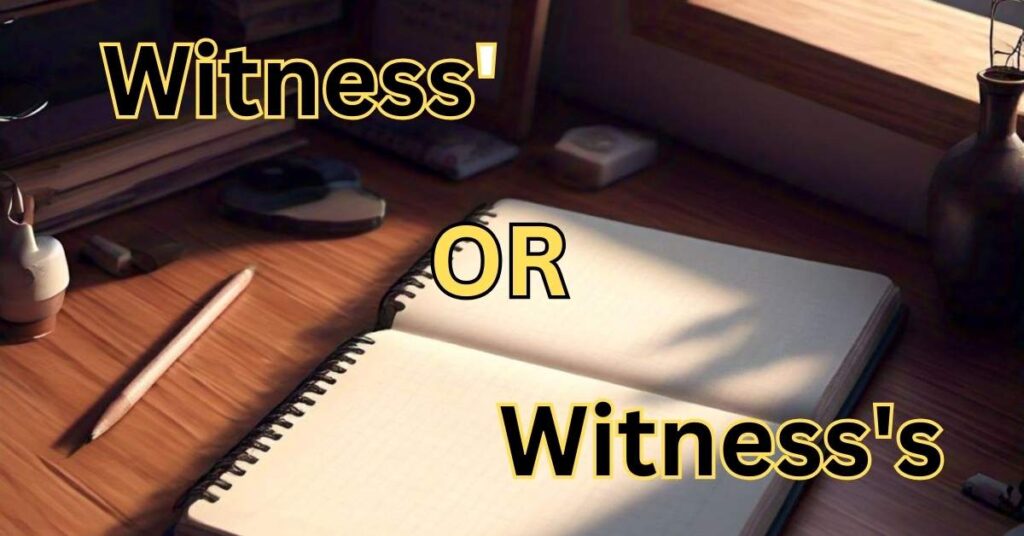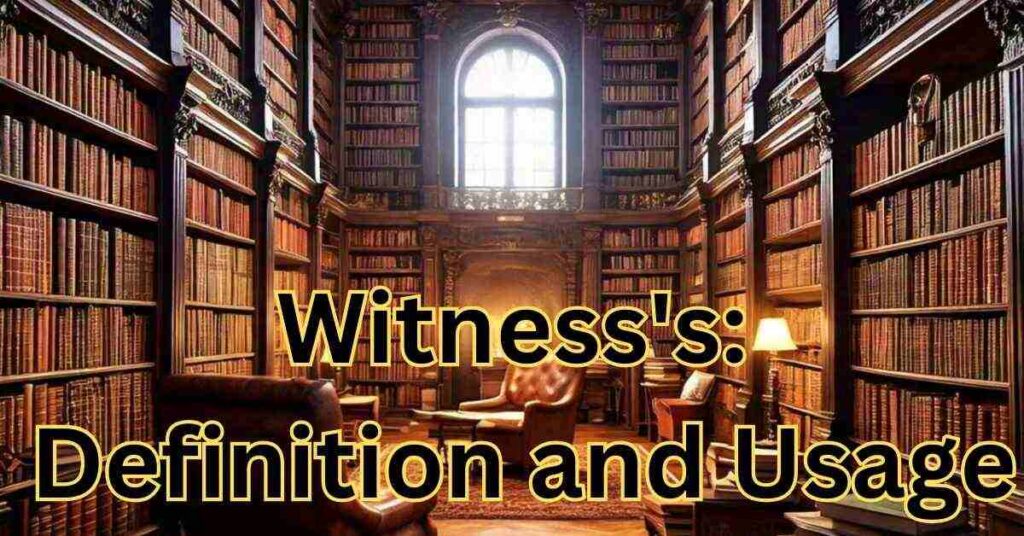Witness’ or Witness’s: which one is correct? This question often confuses writers, especially in formal contexts like legal documents and journalism. Understanding the difference between these two possessive forms can significantly enhance clarity in your writing.
The choice between “witness'” and “witness’s” hinges on grammatical rules and personal preference, but clarity is crucial in fields where precision matters.
In this article, we will explore the definitions and usages of both forms, examine their origins, and provide practical examples to help you navigate this common grammatical dilemma. By mastering the correct usage of witness’ and witness’s, you can improve your writing consistency and professionalism.
Understanding Witness’ or Witness’s

The terms “witness'” and “witness’s” both refer to something that belongs to a witness. However, they serve different purposes in writing. The confusion arises because both forms can be used to show possession, but their usage often depends on personal preference and the specific style guide being followed.
In general, “witness’s” is widely accepted as the correct form for singular possessive, while “witness'” may appear in some traditional texts. Knowing when to use each form can help avoid grammar mistakes and maintain writing clarity.
What is a Possessive Form?
A possessive form indicates ownership or association. In English grammar, we typically add an apostrophe followed by an “s” to show that something belongs to someone. For example, “the dog’s leash” indicates that the leash belongs to the dog.
In the case of singular nouns ending in “s,” like “witness,” both “witness’s” and “witness’” can be correct depending on the style guide you follow. The Chicago Manual of Style prefers “witness’s,” while some traditional grammar rules might accept “witness’.”
Singular Possessive: Witness’s
The singular possessive form “witness’s” is commonly used to indicate that something belongs to one witness. For instance, you might say, “The witness’s testimony was crucial in the trial.”
This usage aligns with modern grammar rules and is favored in most contemporary writing styles. By using this form, you ensure that your writing remains clear and consistent, especially in legal writing, where precision is essential.
Plural Possessive: Witnesses’
On the other hand, when referring to multiple witnesses, we use the plural possessive form “witnesses’.” For example, “The witnesses’ statements corroborated each other.”
This indicates that the statements belong to more than one witness. Understanding when to use this form helps maintain clarity in your writing, particularly in contexts like courtroom language, where multiple accounts might be presented.
Origins of the Witness’
Historically, some writers have used “witness'” as a possessive form. This usage stems from traditional grammar rules that allowed for dropping the additional “s” after an apostrophe for singular nouns ending in “s.”
However, this form has become less common in modern usage as clarity and consistency have taken precedence in both academic and professional writing.
Witness’: Definition and Usage

“Witness’” serves as a possessive form that some may still encounter. It typically appears in older texts or specific regional dialects. However, its usage can lead to confusion and is often viewed as outdated in professional settings.
For instance, one might read a sentence like “The witness’ account was questioned,” but this could create uncertainty about whether it refers to one witness or multiple witnesses.
Synonyms for Witness’
- Observer
- Bystander
- Eyewitness
- Testifier
- Spectator
- Onlooker
- Attester
- Deponent
- Informant
- Verifier
These synonyms can enhance your writing by providing alternative ways to refer to a witness without repeating the term excessively.
Witness’s: Definition and Usage

“Witness’s” clearly indicates possession by a single witness and is preferred in most modern contexts. It emphasizes clarity when discussing someone’s testimony or account of events.
For example, you might say, “The witness’s description of the event was detailed.” This usage helps avoid ambiguity and ensures that readers understand exactly what you mean.
Side by Side Comparison
| Form | Usage | Example |
| Witness | Non-possessive singular | The witness testified in court. |
| Witness’s | Singular possessive (preferred) | The witness’s testimony was crucial. |
| Witness’ | Singular possessive (alternative) | The witness’ account differed from others. |
| Witnesses | Non-possessive plural | Several witnesses came forward. |
| Witnesses’ | Plural possessive | The witnesses’ statements corroborated each other. |
This table illustrates how each form functions within sentences, helping clarify their meanings.
Read More Article: Totaling or Totalling: What’s the Difference?
Everyday Usage Examples
Everyday conversations and writings, using the correct form of “witness'” and “witness’s” is essential to avoid confusion.
For instance, saying “the witness’s testimony was crucial” clearly indicates possession, while “the witness’ account” may lead to ambiguity. Choosing the right form ensures that your message is understood, particularly in legal discussions where precision is vital.
Witness’ Example
In the sentence “The witness’ story was pivotal to the case,” the use of “witness'” may seem outdated.
While it indicates possession, this form can confuse modern readers who expect “witness’s” in contemporary writing. Clarity is crucial, especially in legal contexts where precise language matters.
Witness’s Example
Conversely, saying “The witness’s account provided clarity,” the use of “witness’s” aligns with modern grammar conventions. This form clearly indicates possession and improves comprehension for readers.
Using contemporary language is especially important in legal contexts, where precise wording can significantly impact the interpretation of testimony and evidence.
Real-World Applications

Understanding these forms is crucial across various fields:
In the Courtroom: Clarity is vital during trials where every word counts.
In News Reporting: Journalists must ensure accurate language when reporting on events.
In Legal Documents: Precision helps maintain document clarity and avoids potential legal issues.
Using correct forms like “witness’s” ensures that legal professionals communicate effectively and maintain credibility.
Read More Article: Targetted vs Targeted: What’s the Difference?
Common Pitfalls to Avoid
Many writers stumble when deciding between these forms due to personal preference or lack of familiarity with style guides. Mixing up singular and plural possessives can lead to confusion about ownership or association in sentences.
It’s essential not only to choose the correct form but also to remain consistent throughout your writing especially important in legal scenarios where precision matters greatly.
Conclusion
Understanding the difference between witness’ or witness’s is essential for clear and effective communication, particularly in legal contexts. While “witness’s” is the preferred modern form for indicating possession, some may still encounter “witness’.”
Choosing the correct possessive form enhances clarity and professionalism in writing. By mastering these nuances, you can ensure your documents convey precise meaning, avoiding potential misunderstandings.
Ultimately, using the right form contributes to better communication and a stronger grasp of English grammar in both formal and informal settings.
FAQ’s: Witness’ or Witness’s
How do you write a witness possessive?
To write a witness possessive, use “witness’s” for singular possession (e.g., the witness’s testimony) and “witnesses’” for plural possession (e.g., the witnesses’ accounts).
What is the plural form of witness?
The plural form of witness is “witnesses.”
When does a word end in a possessive?
A word ends in a possessive when it includes an apostrophe to indicate ownership, such as “the dog’s leash” or “the witness’s statement.”
How do you write a witness?
To write a witness, simply use the word “witness,” which refers to someone who observes an event or provides testimony in legal contexts.

